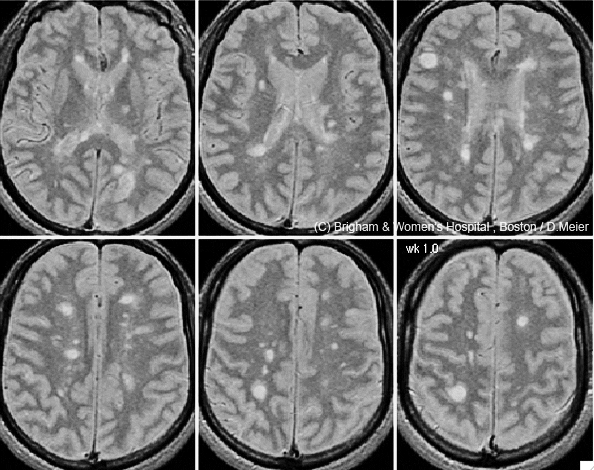Difference between revisions of "Projects:RegistrationLibrary:RegLib C04:About"
| Line 9: | Line 9: | ||
For presentations including the animation below please cite: | For presentations including the animation below please cite: | ||
| − | *[http://www.spl.harvard.edu/publications/item/view/185 Meier et al. , ''NeuroImage'' 2003; 20(2):1193-209.] | + | *[http://www.spl.harvard.edu/publications/item/view/185 Meier et al. , ''NeuroImage'' 2003; 20(2):1193-209.] for the image analysis methodology and [http://www.ncbi.nlm.nih.gov/pubmed/10713356 Weiner et al. , ''J Neuroimmunol'' 2000; 104(2):164-73.] for the data origin. |
| − | |||
---- | ---- | ||
[[Image:MGrid_crop1_full.gif|Example time lapse of a single MS patient of the course of 1 year]] | [[Image:MGrid_crop1_full.gif|Example time lapse of a single MS patient of the course of 1 year]] | ||
Revision as of 20:36, 22 June 2012
Home < Projects:RegistrationLibrary:RegLib C04:AboutMultiple Sclerosis Natural History Study
The images in this case and the time-lapse movie shown below is from a unique longitudinal study, where MS patients underwent weekly to monthly examination including pre- and post-contrast MRI as well as a full clinical evaluation with assessment of clinical disability scores. Because the study was performed before effective disease-modifying treatments became available, it represents a unique snapshot of the natural history of MS that can no longer be reproduced today. The full power of this dataset on visualizing the unique dynamics of MS becomes apparent only after extensive preprocessing that involves spatial registration, intensity-normalization, partial volume filtering and other corrections. You will find more details in the following articles in the SPL publication database:
- 1.Seasonal Prevalence of MS Disease Activity. Neurology 2010
- 2.MR Imaging Intensity Modeling of Damage and Repair In Multiple Sclerosis: Relationship of Short-Term Lesion Recovery to Progression and Disability. AJNR 2007
- 3.Time-series Modeling of Multiple Sclerosis Disease Activity: A Promising Window on Disease Progression and Repair Potential? Neurotherapeutics. 2007
- 4.MRI Time Series Modeling of MS Lesion Development. NeuroImage 2006
- 5.Time-series Analysis of MRI Intensity Patterns in Multiple Sclerosis. NeuroImage 2003
For presentations including the animation below please cite:
- Meier et al. , NeuroImage 2003; 20(2):1193-209. for the image analysis methodology and Weiner et al. , J Neuroimmunol 2000; 104(2):164-73. for the data origin.
